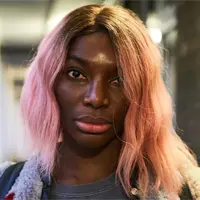I May Destroy You makes good on its cryptic title
-

"I May Destroy You is a cryptic title," says Judy Berman. "It could be a threat, a warning or merely an observation. But throughout Michaela Coel’s phenomenal HBO series, whose finale aired on Monday, the phrase functions more like a collection of questions. Who is speaking here, and to whom—who is the 'I,' and who is the 'you'? Does 'may' mean 'might,' or does it imply the granting of permission? Even 'destroy' has some ambiguity; are we talking about fully obliterating a person or tearing apart their already-crumbling psyche in order to rebuild them stronger, better, healthier? After a full season in which Coel declined to outright explain her title but embraced complexity at every opportunity, the answer to all of these either/or questions seems to be: yes."
ALSO:
- I May Destroy You's daring, complex ending resists tidy explanations
- I May Destroy You is revolutionary storytelling and “Ego Death” is a befitting finale
- The finale is an ode to the impossibility of endings
- Michaela Coel recalls her journey to the ending: "I was looking at all of these characters and realizing that they were quite predictable, so I was able to predict how these little humans, in this world that I created, were dealing with their traumas," she tells Vulture. "And it’s almost like clicking again for me, and when I realized that there was a game, for me, I realized there was a way I could win it and go into the next phase. It’s something to do with growth, and it’s definitely something to do with allowing each of these characters to let go. Kwame has to let go of caring about what people think of him, of feeling like he is a person that should be punished, and that his pleasure is punishment, and that he’s not a nice person. It doesn’t matter that Nilufer thinks that he is basically a rapist; he has to let it go. He has to let it go. All these people have to let things go, but there is a way of viewing that which is deeply offensive. But I, Michaela, have had to let it go. I’ve had to let it go. I had to let it go and realize that I was still alive if I let it go, and the trauma did not need to define me. I could let go of the trauma, and I would still be here. The trauma — it pulsates, and it’s everywhere, and I’m not trying to dictate anybody’s lives, but speaking for Arabella, the trauma becomes the thing that feeds her, and sometimes the idea of her and me letting it go is scary simply because you don’t know what life is without it. And so it’s like jumping off a cliff. But you know what that was also like for me? It was like deleting my Instagram..."
- Coel breaks down the finale and explains why she's sworn off social media: “You can call out a rapist on Twitter, but in real life, does anything affect that person?” says Coel. “Have they gone to their jobs? Have the police come around to their house? We're trying to change things through Twitter, and I don't know how much it's actually working. I'd love to see data as to how much our efforts are yielding actual, real change.”
- Coel has so embraced learning to let things go that she doesn't remember specific edits: “I don’t remember,” she says with a shrug. “I’m not holding onto it … because, for me, you’ve got to keep practicing the habit of letting things go.”
- Weruche Opia recalls her audition process: "There was just this immediate chemistry between us, and I remember leaving the audition like, 'What was that?' It just felt like an incredible first date where you feel like, 'Yeah, I definitely want to see that person again.' A month later, I got the call that I got the job."
- Opia talks about whether Terry has complicity in what happened to Arabella
- Costume designer Lynsey Moore on styling I May Destroy You: "They like to say, ‘This is who I am. This is me.’ And it’s about expressing themselves and feeling comfortable in your own skin," she says. "These aren’t people who have got masses of money. It’s not about going out and spending money for the sake of having lots of expensive clothes. It’s about finding pieces that show who they are and their creativity and their arty side.”
- Music supervisor Ciara Elwis recalls the challenge of obtaining the rights to “It’s Gonna Rain" by Rev. Milton Brunson: “Straightaway, I knew: OK, right, this is going to have to be approached very carefully,” said Elwis, who wrote a long letter to the song’s rights holders (Brunson died in 1997) explaining what Coel was trying to accomplish in the series. She even had Coel, who’d spent a portion of her life in the Pentecostal church, add a few personal words to make clear how critical “It’s Gonna Rain” was to the key scene. The song's owners initially balked, but Elwis persisted and secured the rights.
- Coel breaks down some of her favorite tracks from I May Destroy You
TOPICS: I May Destroy You, HBO, Ciara Elwis, Lynsey Moore, Michaela Coel, Weruche Opia, Costume Design, Music and TV, Series Finales
More I May Destroy You on Primetimer:- Presenting TV's best friendships, from Seinfeld to PEN15 to Insecure
- HBO is leaving Euphoria fans to fend for themselves after "traumatizing" them
- The miniseries has evolved from inside joke to becoming hugely popular in the streaming TV era
- Michaela Coel's Emmys speech dedicated to sexual assault survivors was something rare -- a speech directed at viewers, not attendees
